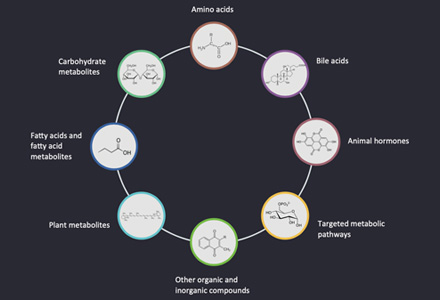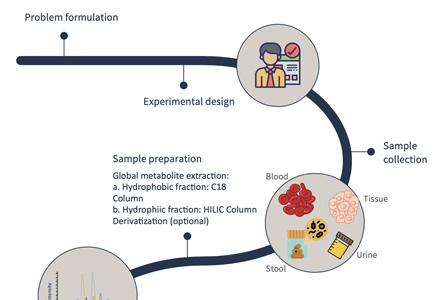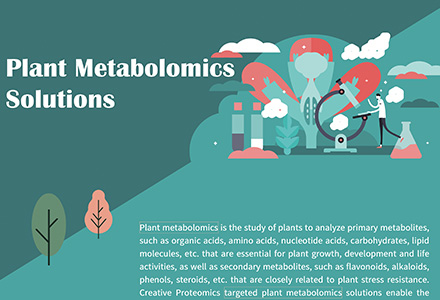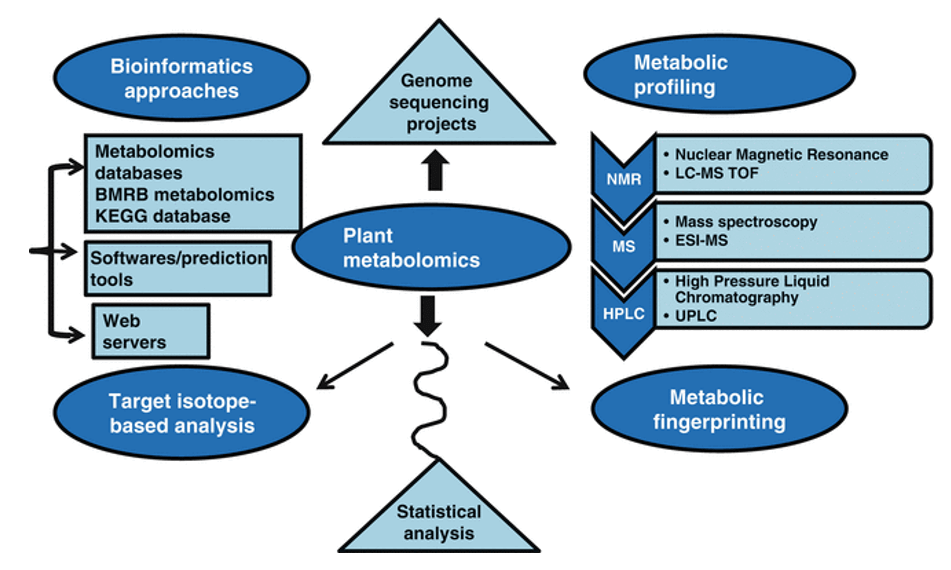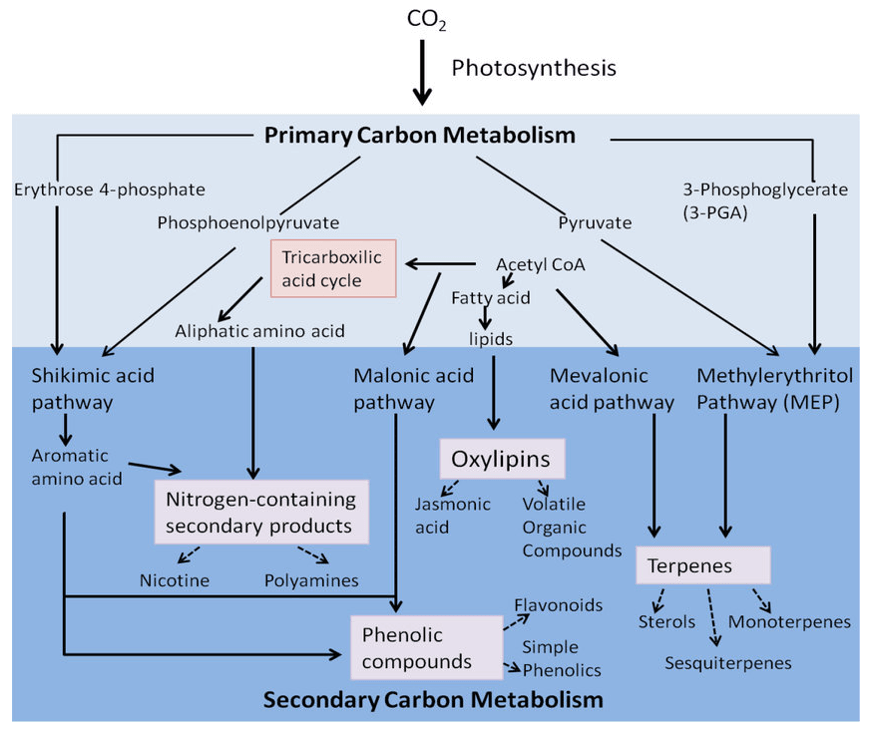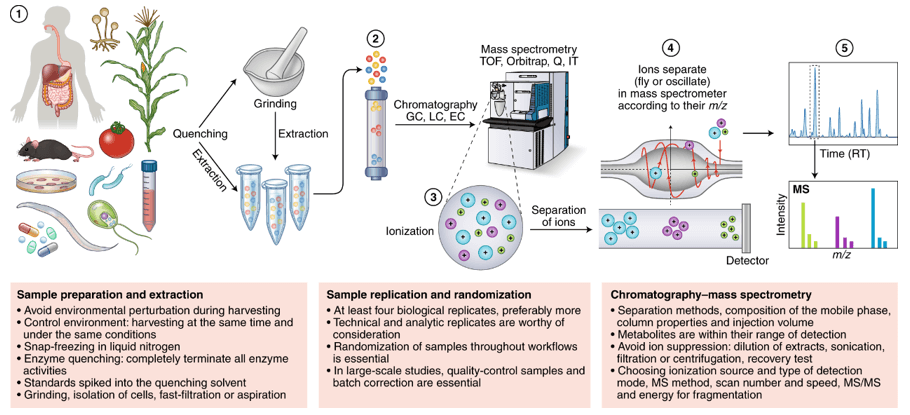Coenzyme Q10 Analysis Service
Submit Your InquiryCoenzyme Q10 (CoQ10) is the only Coenzyme Q substance in the human body. It is also a class of fat-soluble quinone substances widely present in the body. It plays an important role in the mitochondrial respiratory chain. It can participate in the process of oxidative phosphorylation and ATP generation. CoQ10 has been proven to have antioxidant and scavenging free radicals, anti-tumor and improve human immunity, relieve fatigue and improve exercise capacity, anti-aging and anti-aging, and protect cardiovascular and other health effects. In addition to medicinal use, CoQ10 can be used as an additive in some high-end cosmetics and food additives, so CoQ10 is an important raw material for food, medicine, cosmetics and other industries.
Creative Proteomics has established a highly accurate and feasible reversed-phase high performance liquid chromatography (RP-HPLC) and LC-MS for the determination of CoQ10, providing qualitative and quantitative analysis of CoQ10 and its derivatives.
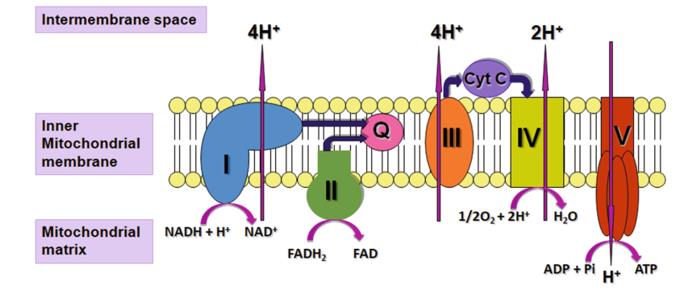 Figure 1. Diagram of the mitochondrial respiratory chain (MRC) and complex V illustrating proton (H+) movement during oxidative phosphorylation. Q: Coenzyme Q10. Cyt C: Cytochrome c. (Hargreaves 2019).
Figure 1. Diagram of the mitochondrial respiratory chain (MRC) and complex V illustrating proton (H+) movement during oxidative phosphorylation. Q: Coenzyme Q10. Cyt C: Cytochrome c. (Hargreaves 2019).
Applications of Coenzyme Q10 Analysis
- CoQ10 content analysis application
- Ensure the quality and safety of food additives
- Dosage monitoring of business health products and medical drugs
- Evaluation of the biological activity level of CoQ10
- Increase understanding of the biological functions of CoQ10
- Advanced cosmetics improvement
Advantages of Our Coenzyme Q10 Analysis Service
Service Workflow
In our technical process, the peak time of the sample is appropriate and the separation effect is good. The volume ratio of methanol to ethanol in the mobile phase is selected to be 20:80. At this time, CoQ10 has a good separation effect and chromatographic response. The method has high precision, good repeatability, good recovery rate and high feasibility.
 Figure 2. Coenzyme Q10 analysis service workflow.
Figure 2. Coenzyme Q10 analysis service workflow.
Detection method: RP-HPLC
Mobile phase: The volume ratio of methanol to ethanol is 20:80
Elution mode: Isocratic elution
Injection volume: 20 ul
Flow rate: 1.0ml/min
Detection wavelength: 275nm
Detection limit: 0.23ug/ml
Limit of quantification: 0.69ug/ml
Coefficient of variation value: 1.27%
Relative standard deviation: 2.93%
Standard recovery rate: 97.07%
Analysis content:
- Construction of standard straight lines
- Screening of mobile phase volume ratio
- The optimal parameter setting of HPLC instrument
- Optimization of chromatographic elution conditions
- Limit of quantification analysis
- Chromatogram raw image and data collection
- Determination of CoQ10 and Its metabolites
Sample Preparation
- Serum/plasma: 50ul/sample
- Urine: 50µl/sample
- Bile: 10ul/sample
- Tissue: 50mg/sample
- Fresh stool: 50mg/sample
- Freeze-dried stool: 5mg/sample
- Cell: 4×106/sample
- Sample storage and transportation: Store in liquid nitrogen or -80°C, and transport on dry ice.
Number of biological replicates: At least 6 biological replicates for plant samples, and at least 10 biological replicates for animal samples The samples include multiple sample types such as animals, plants and microorganisms, please contact us for details.
Delivery
- Comprehensive experimental procedure
- Sample purification analysis
- Chromatogram raw image and data analysis report
- Determination of CoQ10 and metabolites
- Customized analysis report
Creative Proteomics can meet your needs for multiple sample types of analysis, providing you with a comprehensive solution. Please contact us if you would like to test for additional metabolites.
References
- Hargreaves IP, Mantle D. Coenzyme Q10 Supplementation in Fibrosis and Aging. Advances in Experimental Medicine and Biology. 2019;1178:103-112.
- Zozina VI, Covantev S, Goroshko OA, et al. Coenzyme Q10 in Cardiovascular and Metabolic Diseases: Current State of the Problem. Current Cardiology Reviews. 2018;14(3):164-174.


